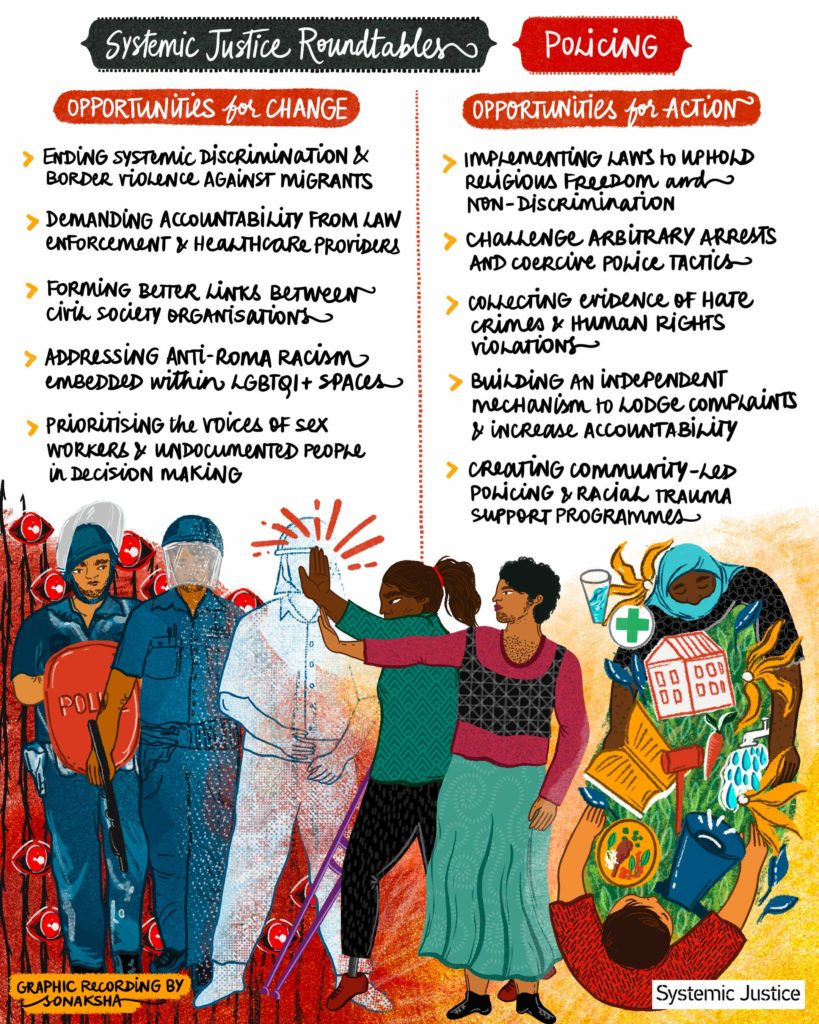“Marginalised groups have to be the main protagonist. It’s a huge contradiction that mono-cultural groups have control… We are done with white saviours –– we need allies, we have the tools to really empower ourselves.”

“Who protects us from the police?” The Equinox Initiative for Racial Justice asked this question in its report with the same title from last year about structural racism in law enforcement in Europe. This report, as well as the European Network Against Racism’s publication of the same year underlined what racialized communities in Europe have always known: that cases like the police murder of George Floyd are also part and parcel of communities’ experience with policing in Europe.
Across the region, we are seeing what a participant in our 23-24 May roundtable on policing called “a treasure trove of injustices”. Police brutality, excessive violence, over-surveillance, profiling (amplified by technology), right suppression, and no accountability from individuals or institutions are leaving marginalised communities overpoliced and underprotected.
In spite of these sometimes daunting sounding challenges, there are successes that we can build on.
- In France, the first class action lawsuit targeting police has gone to the highest administrative authority, where campaigners are seeking an end to racial profiling, including a change in a penal code that currently gives officers carte blanche to check IDs without needing to keep any record of this. They are also asking for an independent mechanism to lodge complaints.
- In the UK, the use of facial recognition technology –– notorious for only working properly on white, male faces – by the Wales police has been successfully challenged.
- In the Netherlands, a challenge to the Dutch military police using racial profiling (the case was brought by a Black man stopped at border control for “not looking Dutch”) was unsuccessful in first instance, but even before the appeal was heard, the police announced they were abandoning the practice due to the (international) public outcry that followed the ruling.
Participants in the roundtable, which included activists from across Europe working on Roma and sex workers’ rights, organisers working with Muslim communities, undocumented people, those facing detention and deportation, and families of victims of police violence, explored the opportunities for action that emerged from their day-to-day work, and priorities for pursuing change.
Common problems and priorities for change emerged such as the focused targeting of Black and brown activists by the police. A participant noted that, in her country, visibly Muslim women protesters are often the target of police violence.
Organisers from different countries all shared instances of police using false pretences, community infiltration, disruption tactics, and coercive behaviour, particularly to target undocumented people. In one country, police conduct arbitrary raids of sex worker workplaces under the guise of rooting out “organised crime networks”. This allows them to seize phones and collect names and identities; making these details public often causes serious disruption to sex workers’ private lives and employment. Elsewhere, organisers are seeing police use entrapment techniques. For example, they will call undocumented people in for mandatory meetings, such as meetings to check their current address, as a pretence for carrying out arrest, detention, and deportation.
Even the seemingly insurmountable challenge of finally holding a police officer accountable for a killing was shared and discussed between participants with first-hand experience of a loved one’s death at the hands of the police. In countries where there is no independent investigation procedure into the police, campaigners are faced with a hugely biased, lengthy and costly process in their fight for justice. The power of solidarity on this issue was expressed by a long-time campaigner on justice for families of victims of police violence, who hopes to one day see an international class action brought to address this issue.
And yet, despite these challenges, there was a strongly shared feeling that the solutions and action that moves us towards these solutions must come from communities experiencing policing themselves. “We have to find the solutions ourselves and give them to our community,” one participant remarked. At the closing, people shared feeling energised and keen on meeting in person to connect and strategise further with others working in the regional context. “It is so good to have a European conversation about this, instead of always talking about the US.”
